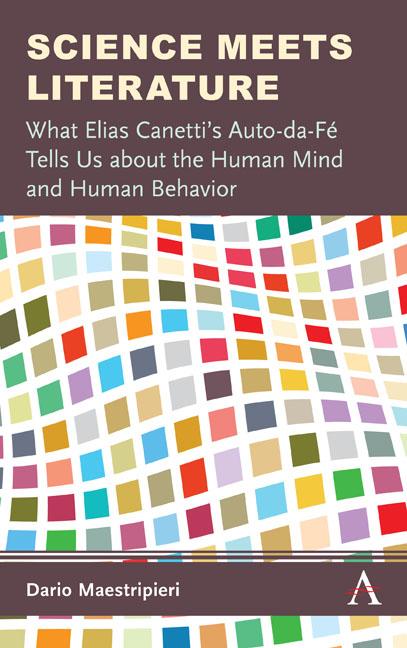 Science Meets Literature
Science Meets Literature Book contents
- Frontmatter
- Contents
- Preface
- Acknowledgments
- Chapter One Why Science and Literature?
- Chapter Two Elias Canetti: A Visionary Literary Genius on a Quest to Understand Human Nature
- Chapter Three The Plot of Auto-da-Fé
- Chapter Four Auto-da-Fé Is a Novel about Human Nature
- Chapter Five Major Themes Running Through Auto-da-Fé
- Chapter Six Analysis of Part I: A Head Without a World
- Chapter Seven Analysis of Part II: Headless World
- Chapter Eight Analysis of Part III: The World in the Head
- Chapter Nine Narrative Strategies in Auto-da-Fé
- Chapter Ten Consilience, the Canetti Way
- Elias Canetti: Chronology
- References
- Index
Chapter Six - Analysis of Part I: A Head Without a World
Published online by Cambridge University Press: 06 July 2019
- Frontmatter
- Contents
- Preface
- Acknowledgments
- Chapter One Why Science and Literature?
- Chapter Two Elias Canetti: A Visionary Literary Genius on a Quest to Understand Human Nature
- Chapter Three The Plot of Auto-da-Fé
- Chapter Four Auto-da-Fé Is a Novel about Human Nature
- Chapter Five Major Themes Running Through Auto-da-Fé
- Chapter Six Analysis of Part I: A Head Without a World
- Chapter Seven Analysis of Part II: Headless World
- Chapter Eight Analysis of Part III: The World in the Head
- Chapter Nine Narrative Strategies in Auto-da-Fé
- Chapter Ten Consilience, the Canetti Way
- Elias Canetti: Chronology
- References
- Index
Summary
Peter Kien is a reclusive intellectual who lives in an apartment with thousands of books and who does not have any substantial relationships with any other human beings. Kien is not a book collector. Rather, books are mere food containers with the nourishment for his mind. The real library Kien cares about is the one he carries in his mind, his knowledge supported by his prodigious memory. When Kien loses access to his books, he convinces himself that he can carry them in his mind, read them in his mind, and continue obtaining his nourishment from them this way. Kien lives the life of the mind and has little concern for the life of the body. He engages in minimal maintenance activities: he eats the bare minimum daily amount of food to be able to survive, engages in minimum hygienic activities necessary to stay clean and healthy, and wears the same clothes every day. He has no concern for his physical appearance or for physical comfort. Finally, Kien has no interest in other people and in establishing meaningful relationships with them, whether they are family members, colleagues, or casual acquaintances.
Some intellectual readers may be drawn to appreciate Kien and be tempted to selfidentify with him. By the end of the novel, however, they are likely to have changed their mind about it. While Canetti is introducing some positive characteristics of Kien as an intellectual (e.g., his commitment to knowledge and truth), at the same time he is also planting the seeds of doubt. It soon becomes apparent that Kien's scholarship is dubious. Early on, readers are told that his scholarly publications are well known to other scholars, but they are few in number, so he is generally unproductive as a scholar. Kien is always working on some manuscript, but this work is vague and undefined. Indeed, it is not clear how he studies his books and what he extracts from them and how. It soon becomes apparent that Kien's intelligence and scholarship are used more as an armor for protection from reality than as a tool for understanding it. Kien has poor ability for introspection, for understanding his own thoughts and behavior, his own needs and weaknesses. He has an even poorer ability to understand others, the motives that drive other people's actions, and the rules that regulate human social affairs.
- Type
- Chapter
- Information
- Science Meets LiteratureWhat Elias Canetti's Auto-da-Fé Tells Us about the Human Mind and Human Behavior, pp. 113 - 128Publisher: Anthem PressPrint publication year: 2019


